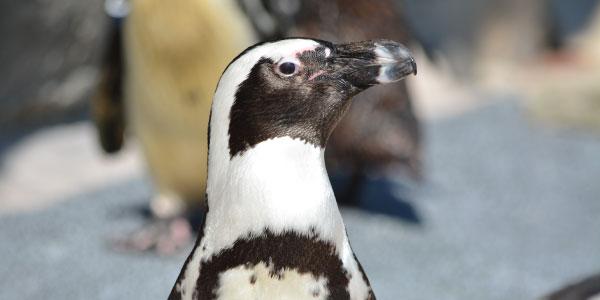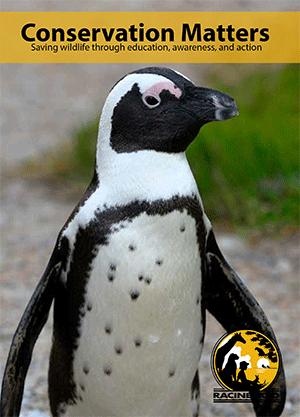
|
You can meet at the Racine Zoo:
|
Blue/Yellow, Female, born October 29th, 1984
Alake, Female, born February 17th, 1991
Robben, Female, born March 27th, 2006
Linus, Male, born January 28th, 2013
Eon, Male, born May 14th, 2007
Bob, Male, born January 4th, 2006
Norman, Male, born February 10th, 1995
Stevie, Male, born June 25th, 2009
Kobe, Male, born January 17th, 2016
Stanley, Male, born October 11th, 2009
|
|
Location at the Racine Zoo:
|
Near Meerkat Manor
|
|
Scientific Name:
|
Spheniscus demersus |
|
Conservation Status:
|
Endangered |
| Lifespan: | 10 – 15+ years in the wild; up to 25 years in human care |
| Adult Size: | Around 2 ft tall and around 7 lb |
|
Diet in the wild:
|
Fish, squid, and crustaceans
|
|
Diet in the Zoo:
|
Various kinds of fish
|
|
Habitat:
|
Rocky, temperate, coastal beaches
|
|
Range:
|
Found along the coastlines of South Africa
|
|
Threats:
|
Global-warming-induced shifts in the marine and atmospheric environment are destructive to the African penguin’s habitat and are a major threat to the bird. Other severe threats include guano and egg collection at breeding colonies, oil pollution, and commercial fishing. |
Fun Facts:
- The only penguin species found in Africa.
- These penguins dig nest-burrows, with guano (feces of seabirds and seals) being the preferred nesting substrate. The removal of guano for commercial purposes forces penguins to nest on the surface in the sand under the shelter of bushes. These sand nests increase susceptibility to heat stress and ready access to predators.
- Males are larger than females, with larger beaks.
- African penguins are monogamous; they mate with the same individual for many years.
- They can swim up to 12mph. An average dive of an African penguin lasts 2.5 minutes, and is regularly about 98 ft in depth, although depths of up to 426 ft have been recorded.
- Also called jackass penguins because they emit a loud, braying, donkey-like call.
- They have a small pink gland above each eye, which helps them cope with high temperatures. Blood is sent to the glands where it is cooled by the surrounding air, and keeps the animal cooler. The glands get pinker the hotter it gets.
Conservation Messages:
-
Fish that provide penguins with food is also the target of large commercial fishing. By participating in the Seafood Watch program you can purchase fish that is caught or farmed in ways that protect sea life such as the fish African Penguins eat, and their habitats. Use a Seafood Watch card or download the app to help guide you in your seafood purchases.
Download our African Penguin Conservation booklet!












